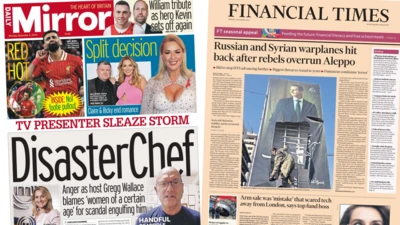We've updated our Privacy and Cookies Policy
We've made some important changes to our Privacy and Cookies Policy and we want you to know what this means for you and your data.
Uncertainty returns to Belfast's Titanic shipyard
Image source, Getty Images
- Author, John Campbell
- Role, │╔╚╦┐ņ╩ų News NI economics and business editor
Top Stories
In August 2019 Harland and Wolff appeared to be finished.
The Belfast shipbuilder, best known for the Titanic, had collapsed into administration after losing the support of its Norwegian owners.
It had not built a ship in nearly 20 years and its workforce had dwindled to just 120, compared to more than 30,000 at its peak, just after World War Two.
But within three years a new owner had landed a huge deal. The shipyard would be part of a Spanish-led consortium to build three Royal Navy support ships, bringing in ┬Ż750m over seven years.
But uncertainty returned after reports that the Treasury was intending to block a government loan guarantee which is seen as vital to the firmŌĆÖs future.
Top Stories
That was robustly denied by the company which described the report as "misleading and inaccurate". The government also said no decision had been made.
Material uncertainty - auditor
Top Stories
However, there is no doubt that the company is in a fragile financial position as it tries to scale up ahead of the planned start of the naval contract next year.
Its last published financial statement covered the first half of 2023 and showed turnover of ┬Ż26m and a loss of ┬Ż32m.
The audited annual accounts for 2022 showed turnover of ┬Ż28m and a loss of ┬Ż70m. In the previous 17 month accounting period the loss was more than ┬Ż25m.
In their assessment of the 2022 accounts the companyŌĆÖs independent auditor said there was "material uncertainty" about the ability to continue as a going concern without new contract wins and additional funding.
The auditor noted that the company was in discussion with potential lenders and investors but there was no certainty that those discussions would be successful.
At the moment the major lender to Harland and Wolff is Riverstone Credit Partners, a New York-based firm which specialises in lending to energy and infrastructure companies.
It has provided a $100m (┬Ż80m) loan facility which is due to mature at the end of this year. It comes with a relatively high interest rate of the Secured Overnight Financing Rate (SOFR) plus 9%.
The SOFR is a benchmark interest rate for dollar-denominated loans which currently sits at around 5%, meaning Harland and Wolff could be paying as much as 14% on that loan.
The company wants to refinance the loan and take on more borrowing at a lower interest rate. This is where the government comes in.
Harland and Wolff wants the government to act as guarantor for up to ┬Ż200m of borrowing from UK banks. That means if the loans were to go bad the government would step in to repay the lenders.
The company has applied for an Export Development Guarantee (EDG), a scheme to help companies who export from, or plan to export from the UK, get loans for general working capital or capital investment.
Normally this involves a guarantee covering up to 80% of the risk to lenders, for a maximum repayment period of five years.
Unusually Harland and Wolff is asking for a 100% guarantee. In February the Labour MP, Kevan Jones, asked how many EDG loans in the last five years had received guarantee on those terms.
The Business Secretary, Greg Hands, replied that there had never been a 100% guarantee but that "in principle, consideration can be given to guarantee percentages above 80% where this is needed to ensure the success of the transaction."
Long-term plan for shipyard
On Wednesday, Harland and Wolff said discussions continue to "progress at pace" with government departments and financial institutions on what is " a complex and large transaction for all parties."
It described its financial partners and shareholders as "highly supportive" and "aware of the long-term plan."
One way to think of Harland and Wolff at the moment is as a start-up rather than a mature industrial company.
Start-ups often operate at a loss in their early years as they develop their products, hire staff and try to break into established markets.
The intention is that revenues will grow and profits will follow but in the meantime investors and lenders will provide the company with a financial "runway."
Harland and Wolff is doing start-up like things such as hiring lots of staff so that it has the scale to deliver profitable projects.
The question now is whether the government will commit to extending its "runway". We are likely to know the answer within weeks.
Top Stories
More to explore
Most read
Content is not available








